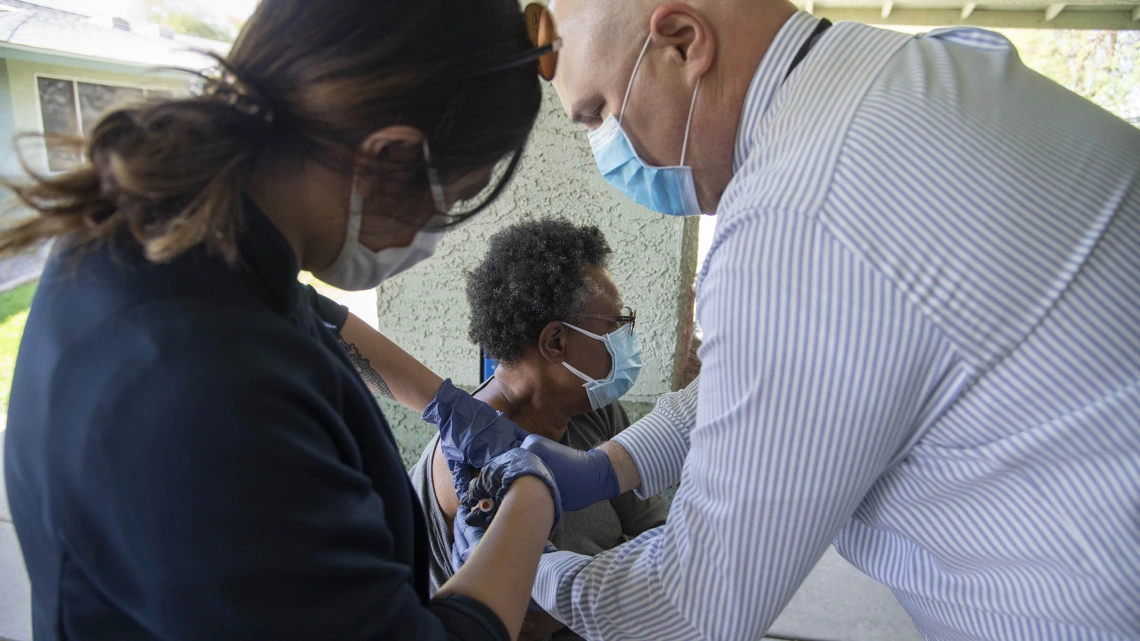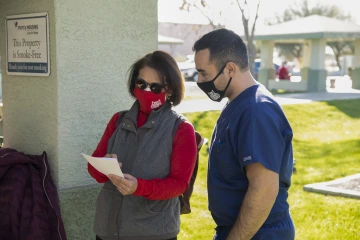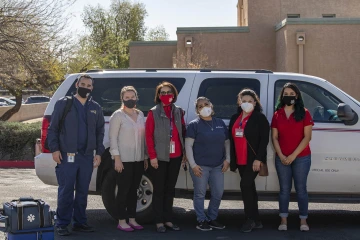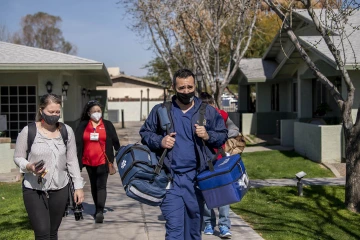Expanding the Reach of COVID-19 Vaccination Efforts
To make COVID vaccine distribution more equitable, the College of Public Health is deploying Mobile Health Units to underserved populations in Maricopa County.

The Mobile Health Unit team brought the COVID-19 vaccine to El Mirage, a city outside Phoenix, on Feb. 8, 2021.
The Maricopa County Health Department recently released data showing a stark divide between COVID-19 vaccine recipients and non-recipients, with higher levels of income correlating with a greater likelihood of receiving at least one dose. With the pandemic posing a greater burden to people of color and those with lower incomes, this lopsided distribution may not be best serving those who are most at risk.

Dr. Cecilia Rosales (left) is bringing COVID-19 vaccines to underserved communities in Phoenix, expanding access to the lifesaving shot.
In a push for more equitable distribution of the COVID-19 vaccines, the Maricopa County Department of Public Health collaborated with the University of Arizona Health Sciences to implement a pilot vaccine distribution program for underserved senior adults in a public housing complex. The pilot, which was successfully completed in February, tested the registration and distribution process, and trained students at the College of Medicine – Phoenix and the College of Pharmacy in Phoenix to administer vaccines.
The key to the pilot program’s success was the Mel and Enid Zuckerman College of Public Health’s well-established Primary Prevention Mobile Health Unit (MHU) program, which was brought to the Phoenix campus in 2016 by Cecilia Rosales, MD, MS, associate dean of community engagement and outreach – Phoenix programs.
“The MHUs already serve these hard-to-reach populations that urgently need the vaccine, and they have relationships of trust,” said Dr. Rosales. “They are perfectly positioned to bring the vaccine to the people, to communities of color that don’t have the technology or transportation options required to get vaccinated by the existing points of distribution.”
Meeting people where they are
Across the country and in Arizona, data show that severe COVID-19 is more likely to strike Black, Native American and Hispanic individuals — and, in Maricopa County, these individuals are less likely to live in areas where there is easy access to the vaccine.

The Mobile Health Unit team and support staff, from left: Jeffery Hanna, Mackenzie Tewell (Maricopa County liaison), Dr. Cecilia Rosales, Alma Ramirez, Maria Jaime and Maryell Martinez.
“Your ZIP code is a bigger determinant of your health and longevity than anything related to your DNA. As they say: location, location, location,” said Sairam Parthasarathy, MD, chief of the Division of Pulmonary, Allergy, Critical Care and Sleep Medicine in the University of Arizona College of Medicine – Tucson, who leads an NIH-funded project to increase COVID-19 awareness in Arizona’s underserved communities, and hopes to secure supplemental funding to assist with Mobile Health Units in Pima County. “Some households are multi-generational. In a smaller home with more people, they breathe in each other’s air, but it’s the older people who are more susceptible to this infection.”
People also may not have access to vehicles, and most of the vaccine distribution sites are currently drive-through locations, which further limit opportunities for vaccination. Many people in underserved communities also are essential workers who must leave the house to work — and who face increased risk of COVID-19 exposure on the job.
“A lot of people can’t stay at home and work on Zoom,” Dr. Parthasarathy said. “They work in spaces that don’t have adequate ventilation. They don’t have a car, so they are taking public transportation, breathing other people’s air.”
Some people, especially in rural areas, might have problems accessing the tools they need to protect their health, such as running water, hand sanitizer or masks, he added. Also, many adults in underserved communities are unable to book vaccination appointments, which is done primarily over the internet.
By meeting people where they are, the MHUs can provide culturally competent care and education to the people who need it most.
“To get your shot, you need to go to an English website. Some people don’t have internet, can’t speak English, can’t read the small letters or have difficulty navigating the clunky website. They’re getting left out,” said Dr. Parthasarathy, who is also a member of the BIO5 Institute. “What if I don’t have internet access? What if I don’t have a smartphone? What if I can’t read? What if I am literate, but the letters are too small?”
Other problems include a lack of widespread education to provide all communities with information to stay healthy, and a gap in adequate training to equip health care providers with cultural competencies to best serve their patients. By meeting people where they are, the MHUs can provide culturally competent care and education to the people who need it most.
Expanding the program across Maricopa County
Maricopa County has worked with the MHUs before, and county health officials say they recognize that the team has nurtured strong relationships and trust in the communities they serve. Looking ahead, officials say they hope to expand the program to make vaccine distribution in Maricopa County more equitable.

Staff and students from the University of Arizona Health Sciences delivered COVID-19 vaccines to residents of a senior public housing complex.
“We tested our program in a senior housing complex in a predominately Spanish-speaking neighborhood, successfully vaccinating 32 residents and health care workers,” Dr. Rosales said. “This is only the beginning!”
In close collaboration with county officials, the MHU team will focus future efforts on underserved communities in public housing and senior housing, and will reach out to neighborhoods where they have established relationships, working with nonprofits that serve those communities.
“All of us in the College of Public Health are deeply concerned about equity in vaccine distribution, and it is a challenge that we are eager to address,” Dr. Rosales said. “Our faculty, staff and students continue to work with state and county health authorities to find ways to reach those communities, often communities of color, with the vaccines needed to save lives and livelihoods.”
Photo Gallery: Bringing COVID-19 Vaccines Where They Are Needed Most

